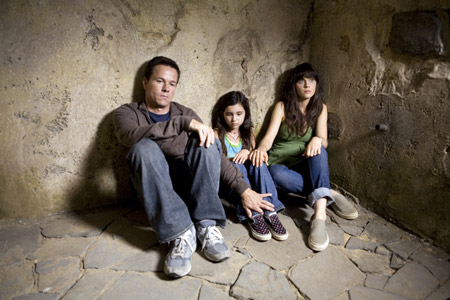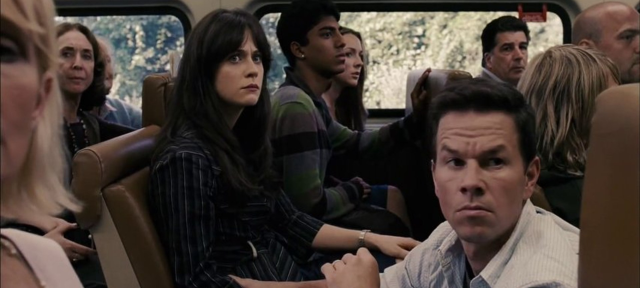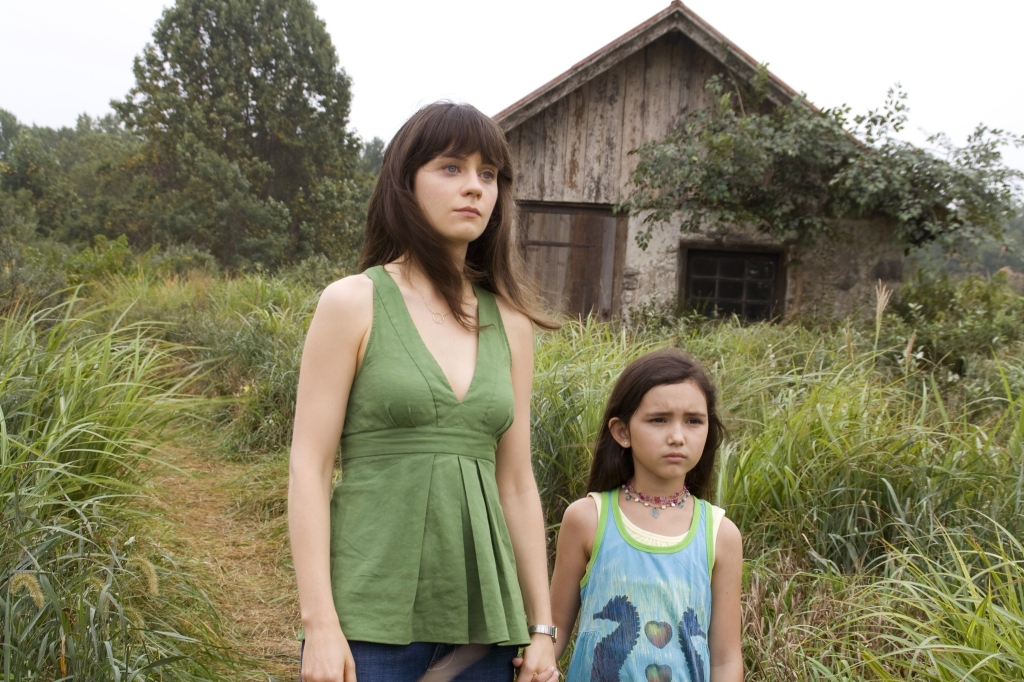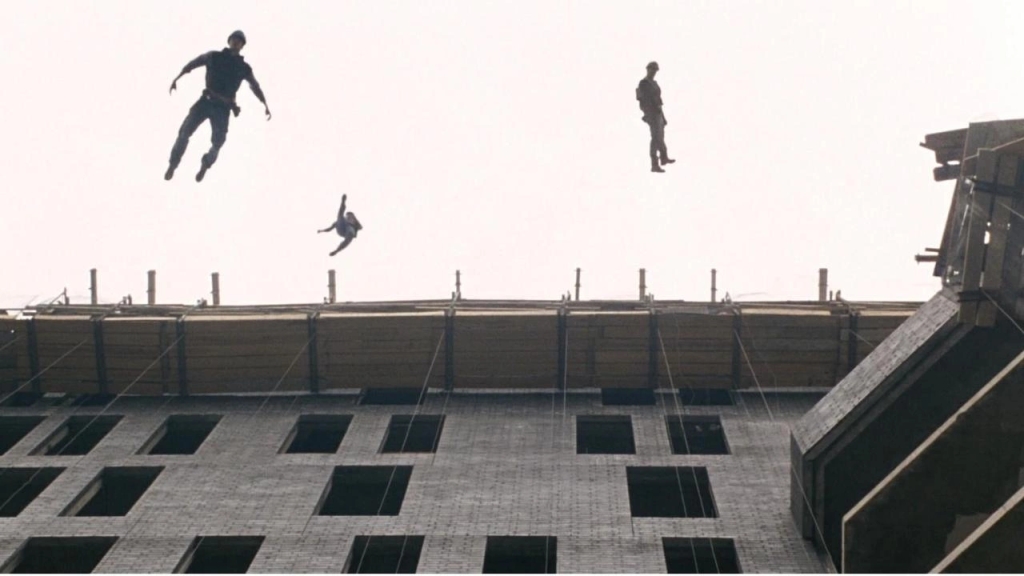Near universally panned, The Happening might not be the first place you’d look for obfuscated depth and meaning within a big budget Hollywood movie. Created by once loved now much maligned auteur M. Night Shyamalan, the film sees heavyweight acting supremos Mark Wahlberg and Zooey Deschanel embarking on a cross-state family migration whilst attempting to survive an unprecedented natural disaster. So far, so cliche. Quirky side-characters who talk to plants and a swiftly killed off pep-talking best friend comfort the audience in the belief that they are watching a normal movie, with normal human characters in it – or at least normal in that highly stylistic humans-don’t-actually-speak-like-this and that’s-just-not-how-emotions-work sort of normal that the film industry specialises in. Reviewers at the time came in to the cinema weighed down with baggage, focussed on the absence of the directors signature twist – Jesus fucking Christ, Bruce Willis was a ghost all the time! – but for poor old Wahlberg and Deschanel, no such twist emerges. Indeed, the absence of twist is almost the films calling card: only half an hour or so in any traditional narrative drama is forcibly excised from the plot, which is explained by a television reporter in advance of it happening in the style of Brechtian theatre. Trees have developed a self-defence against their main predators, a neuro-toxin that causes people to top themselves – a wave of endless suicides that, for science reasons, will swiftly dissipate in roughly 18 hours.
It’s here, in the dearth of any plot development, that things start to getting a little weird – not in content, but in form. Plot explained, the film inevitable end laid out broker from the start, Shyamalan starts toying with the mechanics in a manner first Hitchcock-lite, and later just plain confusing. With the neuro-toxin spread from trees and shrubbery by the wind, the ongoing threat is encapsulated in painfully slight gusts of air – our heroes moan in terror at the sound of rustling, the camera switching to long lingering shots of some slightly quivering grass. Each of these ridiculous, wilfully boring encounters is reinforced by the dialogue, characters staring at the barely moving grass and whispering to one another ‘nothing happened!’ before continuing on with their rather aimless journey. When we do encounter actual danger, it is always framed at a distance, mediated through a television or, in one instance, the lens of a binocular that no character is actually holding. A woman in a diner holds out her mobile phone, showing a video message of a zookeeper deliberately feeding himself to the lions. The aforementioned binoculars reveal a man turning on a fucking lawnmower and then lying down in its path, his body weirdly positioned in the superman pose, one arm stretched out above his head.

Above all else, the film makes a baffling, and distinctly un-Hollywood choice, to define every single character by inadequacy. If we have come to expect people in horror movies to make shit choices, Shyamalan takes this dynamic and runs with it, marking out every single human as woefully unprepared to deal with the horticultural threat. Early scenes are awash with the expected dight of the general public scrambling around like chickens, but when, halfway through we meet the army, inadequacy persists. A single, visibly frighted soldier attempts to take charge, bloodshot eyes wet with tears as her offers the amassed crowds lacklustre direction, then checks to see if they agree with him. Most people spend the entire film just sort of standing around doing nothing, neither particularly scared nor particularly decisive, willing participants in their own drawn out execution.
Once again it is Wahlberg and Deschanel for whom the strangest emotional journey is reserved. The film captures them in the midst of a marriage that is both falling apart and painfully dull – the normal levels of human charisma (typically amplified by films, in which heroes can almost never be boring, or at a loss for words) are almost entirely absent. The wife is having an affair that it soon turns out amounted to a single date eating tiramisu with a work colleague; the husband teaches science to largely indifferent kids at a decidedly run of the mill community college, a profession to which he holds neither skill nor calling. the film provides them with personalities that jarringly swing between ‘rarely represented in Hollywood’ and ‘bizarrely wooden’. Deschanel, stripped of make up, doe-eyed and hopelessly out of her depth, is perennially unable to tell whether she should be overwhelmed by her crumbling marriage or her imminent fauna-ification. As if to underscore the films Brechtian intentions, her visibly autistic mannerisms come hand in hand with a declaration, delivered almost directly to camera, that she ‘has trouble showing her emotions in public’. Wahlberg, for his part, is a leading man without any capacity to actually lead. His best friend ignores his advice (them promptly dies), his desperate pleas for his wife to hand him a map are ignored as she instead questions his forthright tone, and even his pleas for a couple of teenagers to stop attacking a strangers house are completely in vain. Attempts to call upon his intellect are laughable. As guests of wind take out his ever dwindling team of equally despondent comrades, he mumbles a pedagogical mantra shared with his students, some il-fitting nonsense about testing hypothesis, checking for variables. It’s made abundantly clear he’s not actually that good at science – he’s not the under-sung world expert found in the likes of ‘Independence Day’, but rather the acutely mediocre semi-professional grown-up that we all likely recognise from the real world.

Shorn of any twist or narrative development, the film ends in the same deliberately half-baked, B-movie plus, overtly sign-posted manner that it had by now perfected. Holed up in a farmhouse with a tropeish, certifiable old woman, the wind returns and encourages their host to smash her head through a window. Our heroes flee, and are soon arbitrary separated by the hundred metre lawn that stretches between the house and its barn, now a veritable field of death due the toxins increasing hold on the outside world. You have to watch it to get just how achingly manipulated this very under-whelming ending truly is. The old crone set things up nicely for us when, ten minutes earlier she paused halfway through a speech about cookies to declare, for no reason than to set up the ending, that there is a sound pipe that links the barn to the main house, a funnel by which the masters of old could speak to their barn-residing slaves. This tidbit, this expositional nugget, is so incongruous to the wider conversion (still biscuits) that its existence is only to lay foundations for the ultimate finale, the brazenly predictable final scene – Mark Walberg is going to end up speaking to his wife through a pipe in the barn. With the plant toxin on its last legs, Mark Walberg and Zoey from New Girl have only to shelter in place for a few more minutes while the wind dies down, able to comfortably speak to one another without danger through the massively over signposted pipe. They reaffirm their love for one another, hearts reinvigorated from their brush with fatal flora. The clock is ticking down. The 18-hours window is coming to its end. But these aren’t rationale, normal people, remember? For reasons beyond any explanation, Wahlberg suddenly declares he loves his wife too much to speak two her through a fucking pipe, and wanders out in to the field of death to give her a cuddle. She reciprocates, dragging with her their adopted child, which is simply terrible parenting, and our heroes hug it out in the garden, the terror wind picking up and ruffling their stupid hair only for the toxin to that moment to give up the fucking ghost and go away because LOVE CONQUERS ALL DO YOU GET IT DO YOU DO YOU LOVE LITERALLY IS DEFEATING THE FUCKING DANGER WIND BECAUSE MARKY MARK LOVES NEW GIRL SO FUCKING MUCH I MEAN REALLY.
In many ways, it’s pretty unsurprising that people hated The Happening so much. It feels like a B-movie with an unrealistic sense of grandeur, as if someone pritt-sticked a felt gold star onto a plastic crown and tried to pretend they were royalty. And yet, every aspect is so deliberately and incongruously aligned, so methodically shit – the glacial pace, the flat, deliberately expositional dialogue, the bafflingly cinematography, the lack of any actual threat – that actually works. Its a horror movie that keeps undressing, as if shouting, with zero nuance, that the horror is absent from the scene because it’s embedded in your life, leaching out not the real world, the actual climate breaking down outside your window whilst your busy watching Mark Wahlberg pretend to act.

Whilst movies are often obsessed with characters quipping snarky lines as they make some timely observation, calling upon their wit, intellect or strength to solve the puzzle and save the day, the people of The Happening are, like us, frustratingly boring. They don’t react well to the events that surround them, they don’t quip, they barely emote. I can’t help thinking that Wahlberg and co might be better actors that we’d been led to believe. Real people, faced with the end of days, probably would just quietly march towards their demise, heads bowed, bodies lost to the grind of the everyday. And when the end did, inevitably come, would people scream? Would they fling their arms up in terror, or just mutedly lay down in the path of an industrial lawnmower, passively accepting their fate? In a real world engulfed in a climate emergency – a world in which our planet reached the danger temperature of 1.5c for a full year for the first time ever – it seems pretty evident that we, like Mark Wahlberg, struggle all too meekly, barely able to salvage our own existence, barely able to do more than frown at articles in the Guardian and recheck our ever depleting pay packets, more concerned with our marriages and careers than with any mortal danger.
Daniel Alexander Hignell-Tully
